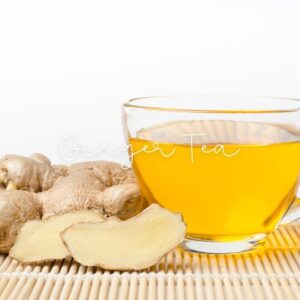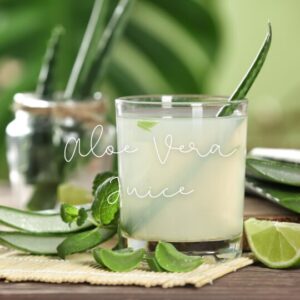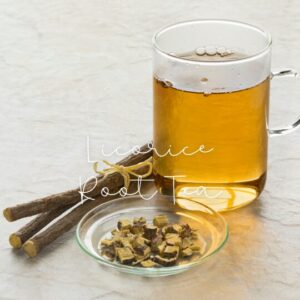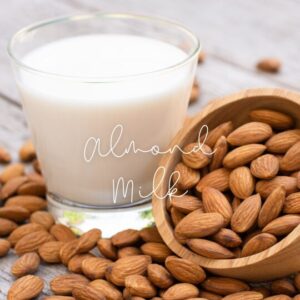Millions of people suffer from acid reflux, experiencing symptoms like heartburn, regurgitation, and discomfort. The good news? You can manage and reduce acid reflux naturally by incorporating specific drinks into your diet.
In this article, we’ll explore the 8 best drinks to stop acid reflux naturally and keep your digestive system running smoothly.
What Is the Best Drink for Acid Reflux?
The following drinks are known for their ability to soothe acid reflux and improve digestive health. Let’s count down the top remedies:
8. Ginger Tea: Can Ginger Tea Help with Acid Reflux?
Ginger tea is a natural remedy with powerful anti-inflammatory properties that reduce stomach acid and soothe the digestive system.
Bonus: Regular ginger tea can also help with bloating and nausea, common symptoms of acid reflux.
Why It Works: Compounds like gingerols and shogaols ease stomach discomfort and promote food movement through the gastrointestinal tract, reducing reflux.
How to Use: Steep fresh ginger slices in hot water for 10 minutes. Add honey for extra throat-soothing benefits.

Ginger is a natural anti-inflammatory and has been used for centuries to treat digestive issues.
Its potent compounds, such as gingerols and shogaols, help soothe the stomach lining and reduce acid production, making it an excellent remedy for acid reflux.
These compounds not only aid in digestion but also enhance the motility of the gastrointestinal tract, which helps in moving food through the system more efficiently, reducing the chances of acid reflux.
Ginger’s anti-inflammatory properties can also help alleviate symptoms of gastrointestinal distress, such as bloating and nausea, which are often associated with acid reflux.
By calming the digestive system, ginger tea helps create a more balanced environment in the stomach, which is crucial for preventing the backflow of acid into the esophagus.
To make ginger tea, take a piece of fresh ginger root, about 1-2 inches long, and slice it thinly.
Place the ginger slices in a cup or teapot, then pour hot water over the ginger and let it steep for about 10 minutes.
This allows the beneficial compounds to infuse into the water. If you prefer, you can add a bit of honey for sweetness.
Honey not only adds flavor but also has its own soothing properties that can help with throat irritation caused by acid reflux.
You can also prepare a larger batch of ginger tea and store it in the refrigerator, reheating it as needed.
Enjoy this warm, soothing drink after meals to help prevent acid reflux.
Drinking ginger tea regularly can also support overall digestive health and help maintain a balanced stomach environment.
For those who prefer a quicker option, ginger tea bags are available in most grocery stores. However, using fresh ginger root is recommended for maximum potency and benefits.
7. Aloe Vera Juice: Is Aloe Vera Good for Acid Reflux?
Aloe vera juice is famous for its healing and anti-inflammatory properties that soothe the esophagus and stomach lining.
Tip: Start with small amounts to test your body’s response, as it may have a mild laxative effect.
Why It Works: Aloe vera creates a protective barrier, reducing irritation and promoting tissue repair.
How to Use: Drink 2-4 ounces of pure, organic aloe vera juice before meals. Avoid varieties with added sugars or artificial ingredients.

Aloe vera is renowned for its healing properties, and it’s especially effective in soothing the digestive tract.
This plant has been used for centuries for its medicinal benefits, particularly in reducing inflammation and promoting healing.
Aloe vera juice works by providing a soothing effect on the stomach lining and esophagus, which can help relieve the symptoms of acid reflux.
The anti-inflammatory properties of aloe vera are due to its rich content of vitamins, minerals, and amino acids, which work together to reduce irritation and promote tissue repair.
This makes it a natural choice for those seeking relief from acid reflux, as it helps to calm the stomach and esophagus.
When choosing aloe vera juice, it’s important to look for pure, organic options that are free from added sugars and artificial ingredients.
Many commercial aloe vera juices contain preservatives and additives that can irritate the digestive system, so always check the label to ensure you are getting a high-quality product.
Start with a small amount of aloe vera juice to see how your body reacts.
Some people may experience a mild laxative effect, so it’s best to introduce it gradually into your diet.
Drinking a small glass, about 2-4 ounces, before meals can help coat the stomach and prevent acid reflux by forming a protective barrier that shields the stomach lining from excess acid.
Aloe vera juice can be consumed on its own or mixed with a small amount of water if you find the taste too strong.
Some people also like to add a splash of lemon juice or a teaspoon of honey for added flavor and additional health benefits.
6. Slippery Elm Tea: How Does Slippery Elm Help Acid Reflux?
Slippery elm tea contains mucilage, a gel-like substance that coats and protects the esophagus and stomach lining.
Additional Benefits: It also supports gut health, helping with gastritis and IBS.
Why It Works: It forms a barrier against stomach acid, reducing irritation and promoting healing.
How to Use: Drink slippery elm tea before meals or at the onset of symptoms for immediate relief.

Slippery elm is derived from the inner bark of the slippery elm tree and has been used for centuries as a natural remedy for various digestive issues.
It contains mucilage, a gel-like substance that coats and soothes the lining of the esophagus and stomach, providing a protective barrier that can help reduce irritation and prevent acid reflux.
The mucilage in slippery elm works by forming a slick, gel-like coating on the mucous membranes of the digestive tract.
This protective layer not only soothes inflammation but also helps to protect the sensitive tissues of the esophagus from the harsh effects of stomach acid.
By providing this protective coating, slippery elm can help alleviate the burning sensation associated with acid reflux and promote healing of the esophagus.
Drink this tea before meals to help prepare your digestive tract and prevent acid reflux.
Alternatively, you can drink it when you feel symptoms of acid reflux coming on to provide immediate relief.
The gentle nature of slippery elm makes it suitable for regular use, and it can be a valuable addition to your natural remedies for managing acid reflux.
In addition to its benefits for acid reflux, slippery elm can also support overall digestive health.
It is known to help with conditions such as gastritis, irritable bowel syndrome (IBS), and other inflammatory digestive disorders.
5. Chamomile Tea: Can Chamomile Relieve Acid Reflux?
Chamomile tea is well-known for its anti-inflammatory and calming properties that ease digestive discomfort.
Extra Perk: Chamomile also promotes relaxation and better sleep, reducing stress—a common trigger for acid reflux.
Why It Works: Chamomile reduces esophageal inflammation and helps relax digestive muscles, preventing acid backflow.
How to Use: Steep chamomile tea for 5-10 minutes and enjoy a cup in the evening to prevent nighttime reflux.

Chamomile is well-known for its anti-inflammatory and soothing properties, making it a natural remedy for a variety of digestive issues, including acid reflux.
The calming effects of chamomile can help reduce the inflammation in the esophagus and stomach lining, which can be caused by excess stomach acid.
Chamomile can help relax the digestive muscles, allowing food to pass more easily through the stomach and intestines, which can prevent the backflow of acid into the esophagus.
Additionally, chamomile contains compounds that promote relaxation and reduce stress levels.
Since stress is a common trigger for acid reflux, drinking chamomile tea can help manage this factor as well.
To make chamomile tea, simply steep a chamomile tea bag in hot water for 5-10 minutes. For a stronger brew, you can use loose chamomile flowers.
Enjoying a cup of chamomile tea in the evening can help you relax and prepare for a good night’s sleep, while also preventing nighttime acid reflux.
The gentle sedative effects of chamomile can promote better sleep, which is crucial because a lack of sleep can also contribute to stress and worsen acid reflux symptoms.
In addition to its benefits for acid reflux, chamomile tea has been used traditionally to aid in sleep and reduce anxiety.
It can also help with other digestive issues such as indigestion, bloating, and gas, making it a versatile and beneficial addition to your daily routine.
4. Licorice Root Tea: What Makes Licorice Root Effective Against Acid Reflux?
Licorice root tea enhances mucus production, providing a protective barrier for the stomach and esophagus.
Note: Consult your doctor before use, especially if you have underlying health conditions.
Why It Works: It shields sensitive tissues from stomach acid while reducing inflammation.
How to Use: Choose deglycyrrhizinated licorice (DGL) to avoid side effects like high blood pressure. Drink 30 minutes before meals for the best results.

Licorice root has been used for centuries in traditional medicine for its natural soothing properties and ability to promote digestive health.
It is particularly effective in healing the stomach lining and reducing inflammation, making it a valuable remedy for managing acid reflux.
Licorice root works by increasing the mucus production in the esophagus and stomach lining.
This mucus acts as a protective barrier, shielding the delicate tissues from the harsh effects of stomach acid.
By enhancing this natural defense mechanism, licorice root helps to prevent and alleviate the symptoms of acid reflux, such as heartburn and irritation.
In addition to its benefits for acid reflux, licorice root has other health-promoting properties.
It can help soothe a sore throat, relieve coughs, and support overall digestive health. Its anti-inflammatory and antioxidant effects contribute to its ability to promote healing and protect against digestive issues.
A word of caution though: when using licorice root for acid reflux, it’s important to choose deglycyrrhizinated licorice (DGL).
DGL is a form of licorice root that has had a compound called glycyrrhizin removed.
Glycyrrhizin can cause side effects such as elevated blood pressure and reduced potassium levels when consumed in large amounts.
DGL retains the beneficial properties of licorice root without the risk of these side effects, making it a safer option for long-term use.
For best results, drink this tea 30 minutes before meals.
This timing allows the protective mucus coating to form and helps prevent acid reflux symptoms during and after eating.
When incorporating licorice root tea into your routine, it’s essential to use it mindfully.
While DGL is safe for most people, it’s always a good idea to consult with a healthcare provider, especially if you have any existing health conditions or are taking medications.
They can provide personalized advice and ensure that licorice root tea is appropriate for your specific needs.
3. Almond Milk: Is Almond Milk Good for Acid Reflux?
Almond milk is an alkaline, dairy-free alternative that neutralizes stomach acid.
Extra Tip: Blend almond milk with bananas or spinach for an even more soothing drink.
Why It Works: It’s easier to digest than cow’s milk and doesn’t aggravate acid reflux symptoms.
How to Use: Drink plain almond milk or use it as a base for smoothies and cereals. Choose unsweetened varieties to avoid added sugars.

If you’re looking for a dairy-free option to help manage acid reflux, almond milk is a fantastic choice.
Unlike cow’s milk, which can sometimes exacerbate acid reflux symptoms due to its fat content, almond milk is alkaline and can help neutralize stomach acid.
This makes it a gentle and soothing option for those dealing with acid reflux.
Almond milk is not only beneficial for its alkaline properties but also for its rich nutrient profile.
It is a good source of vitamins and minerals, including Vitamin E, magnesium, and calcium, which support overall health.
Vitamin E acts as an antioxidant, protecting your cells from damage, while magnesium helps regulate muscle function, including the muscles of the digestive tract.
One of the significant advantages of almond milk is that it is easy to digest.
For individuals who are lactose intolerant or sensitive to dairy, almond milk provides a lactose-free alternative that won’t trigger acid reflux.
Its smooth and creamy texture makes it a versatile ingredient in various recipes, from smoothies to cereals and baked goods.
There are several ways to incorporate almond milk into your diet to help keep acid reflux at bay.
You can enjoy a glass of almond milk on its own as a refreshing and soothing beverage, particularly when you experience acid reflux symptoms.
Using it as a base for smoothies is another great option; blend almond milk with fruits, vegetables, and a handful of nuts or seeds to create a nutritious and delicious drink.
Adding ingredients like bananas, spinach, and chia seeds can further enhance the smoothie’s digestive benefits.
Almond milk can also be added to breakfast cereals and oatmeal instead of cow’s milk, offering a mild flavor that complements a wide range of ingredients and makes your morning meal both enjoyable and beneficial for your digestive health.
Additionally, you can incorporate almond milk into your baking recipes, substituting it for regular milk in muffins, pancakes, and other baked goods, providing a dairy-free and reflux-friendly alternative.
When choosing almond milk, it’s important to select unsweetened varieties to avoid added sugars, which can sometimes worsen acid reflux symptoms.
Additionally, look for almond milk fortified with calcium and other essential nutrients to ensure you’re getting the maximum health benefits.
2. Coconut Water: Does Coconut Water Help Acid Reflux?
Coconut water is naturally alkaline and hydrating, making it perfect for neutralizing stomach acid.
How to Use: Drink pure, unsweetened coconut water throughout the day to manage symptoms and stay hydrated.
Why It Works: It balances stomach pH and provides electrolytes like potassium and magnesium, which support digestion.

Coconut water is naturally alkaline, which makes it an excellent choice for neutralizing stomach acid and helping to control acid reflux.
Its alkaline nature helps balance the pH levels in your stomach, reducing the likelihood of acid reflux symptoms.
Beyond its alkaline properties, coconut water is incredibly hydrating and packed with electrolytes, such as potassium, magnesium, and calcium.
These electrolytes play a crucial role in maintaining overall digestive health and ensuring the proper function of your digestive system.
Staying well-hydrated is essential for keeping your digestive tract running smoothly and preventing the conditions that can lead to acid reflux.
Coconut water can be consumed throughout the day to keep acid reflux under control and to stay hydrated.
It’s a refreshing and natural beverage that can be enjoyed on its own or combined with other ingredients for added benefits.
For instance, mixing coconut water with aloe vera juice can enhance its soothing properties, providing even greater relief from acid reflux symptoms.
When choosing coconut water, opt for natural, unsweetened varieties to avoid added sugars that can worsen acid reflux symptoms.
Always check the label to ensure you’re getting pure coconut water without any unnecessary additives.
1. Apple Cider Vinegar: Can ACV Really Help Acid Reflux?
Apple cider vinegar (ACV) balances stomach pH and stimulates digestive enzymes.
Caution: Avoid excessive use to prevent irritation of the throat or stomach lining.
Why It Works: It prevents overproduction of stomach acid and supports proper digestion.
How to Use: Mix 1-2 teaspoons of raw, unfiltered ACV with a glass of water and drink 20-30 minutes before meals. Use a straw to protect your teeth from acidity.

While it might seem counterintuitive to use an acidic substance to combat acid reflux, apple cider vinegar can actually help balance stomach pH and improve digestion.
By increasing stomach acidity in a controlled way, ACV stimulates the production of digestive enzymes, which can aid in breaking down food more efficiently and maintaining a healthy stomach environment.
Apple cider vinegar is known for its many health benefits, including its ability to enhance digestion and reduce symptoms of acid reflux.
It helps to maintain the correct acidity in the stomach, preventing the overproduction of stomach acid that can lead to reflux.
Additionally, ACV has antimicrobial properties that can help maintain gut health by reducing harmful bacteria.
Although ACV can be beneficial, it’s important to use this remedy sparingly, as excessive consumption can lead to negative effects such as erosion of tooth enamel and irritation of the throat and stomach lining.
To prevent these issues, consider using a straw when drinking ACV to minimize contact with your teeth, and always dilute it with water.
Additionally, rinse your mouth with plain water after consuming ACV to help protect your tooth enamel.
Limiting your intake to the recommended dosage and avoiding prolonged use without breaks can also help prevent irritation of the throat and stomach lining.
When selecting ACV, choose a raw, unfiltered variety with “the mother” to ensure you are getting the maximum health benefits from the enzymes, proteins, and good bacteria it contains.
Drink this mixture 20-30 minutes before meals to help prevent acid reflux.
The timing is crucial as it allows the ACV to stimulate digestive enzymes and prepare your stomach for the incoming food, reducing the chances of acid reflux.
In addition to helping with acid reflux, apple cider vinegar can support overall health in various ways, such as aiding in weight management, improving blood sugar levels, and boosting skin health.
However, moderation is key to reaping its benefits without experiencing adverse effects.
What Else Can You Drink for Acid Reflux?
Other drinks like fennel tea, diluted lemon water, and herbal teas (without caffeine) can also provide relief. Experiment to see what works best for your body.
And there you have it—the 8 best drinks to stop acid reflux naturally: ginger tea, aloe vera juice, slippery elm tea, chamomile tea, licorice root tea, almond milk, coconut water, and apple cider vinegar.
By incorporating these into your daily routine, you can manage acid reflux, soothe your digestive system, and improve your overall health.
What’s Your Go-To Remedy for Acid Reflux?
We’d love to hear from you! Share your favorite drinks or tips in the comments below to help others find relief.
Stay healthy and take care!